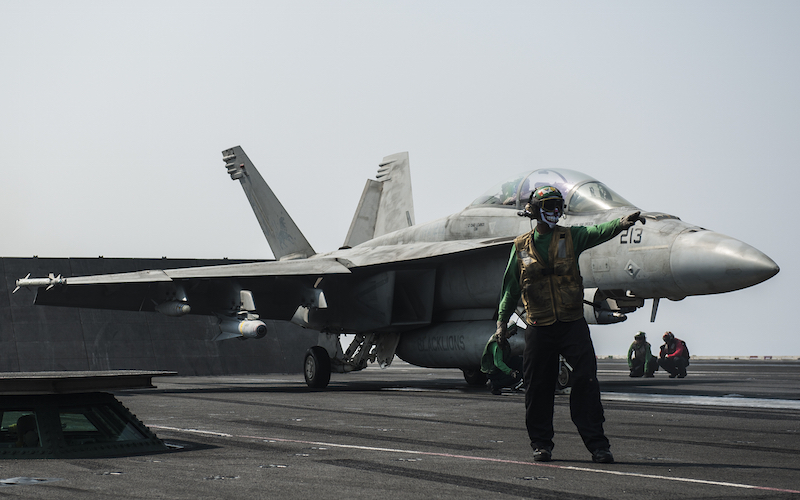
As America Fights Terror, it Loses More Than it Gains
As the United States ramps up its ‘no boots on the ground’ war against jihadists in Iraq and Syria, the stream of threats emanating from the region appear to grow ever wider and deeper. The emerging U.S. policy of containment and degradation in Iraq and Syria looks very much like a repeat of the failed strategies it pursued in Afghanistan, and previously in Iraq.
Such kinetic, defensive approaches may prevent attacks on the homeland in the near-term, and may even prevent fragile states such as Afghanistan, Syria or Iraq from disintegrating into “ungoverned space” such as Libya, Somalia and Yemen, but they will never defeat the appeal of Islamic terrorism to tens of thousands of aspirants from around the world.
Al Qaeda (writ large to include the Islamic State) is the ultimate asymmetric enemy. After more than a decade of war, the West is being seriously out-maneuvered and out-fought. Not a single terrorist group that America has declared war on has been decisively defeated. Even though much has been learned since 9/11, the U.S. government still does not understand the nature of jihad. Jihadists share a common Koranic Armageddon narrative which unites them in hatred of the U.S., while America struggles to define what “terrorism” means in its statutes.
Despite thousands of American lives and countless non-combatants having been lost, trillions of dollars spent, and American prestige having been squandered in the process, the U.S. remains under multiple terrorist threats.
These range from air passengers’ clothing soaked in liquid explosives to bombs sewn into people’s bodies to efforts to introduce the Ebola epidemic to America with infected suicide attackers and aerosol sprays.
Saudi Arabia’s money and Pakistan’s support are the primary reasons why Al Qaeda has survived and grown since 2001. The toxic mix of radical Islam, Gulf oil money, sympathetic fighters in the tribal regions, and safe houses in cities is unique to Pakistan. Diplomatic failures, nuclear non-proliferation concerns, over-reliance on drones and the Bin Laden raid have all led to permanent “frenemy” status with Pakistan.
Pakistan’s stolen nuclear technology is a primary reason why America’s “AfPak” efforts failed. It could have done what needed to be done in 2002, but for Pakistan’s refusal to grant the U.S. access to its ungovernable tribal regions. As long as the enemy has sanctuary and freedom of movement, America cannot win there. A putative ally who helps the Taliban and the Haqqani Network kill Americans, most likely in part with American taxpayer money, could be deemed worse than no ally at all.
What has become the prototypical American strategy of invading, changing regimes and occupying and arming allies should instead be focused on defeating the enemy and the eventual disarmament of populations. More weapons floating around and more people under arms are exactly what these troubled countries do not need. If the enemy were decisively defeated, the U.S. would not need to continue to rely on a strategy of training local forces to finish the jobs it started.
Regardless of location, the enemy needs to be routed in an east-to-west fashion — clearing every cave and basement of every fighter — and then leaving. America is great at building bases, but terrible at building trust. It must learn that insurgencies cannot be defeated with airpower.
Going back to Vietnam, the U.S. dropped hundreds of tons of ordnance for very little in tangible gains on the ground. The only time America got ahead of the game in Iraq was when U.S. troops lived among Iraqis during the surge. That fact should influence the Obama Administration’s choices in Iraq and Syria today. The American people would surely rather have a President who reneges on an outdated promise than one who is so casualty-averse that he cannot devise and advance a winning strategy.
Motivation also matters, in the sense that a U.S. soldier fights for his buddies, but a jihadist fights for his cause. American soldiers struggle to defeat an enemy whose only creed is victory or death. American political sensitivity to collateral damage and force protection means that, by definition, its soldiers fight in too constrained a manner.
Jihadists know this and ensconce themselves amongst civilians, so that, either way, they win. They either live to fight another day or they become martyrs to motivate new aspirants. On the deepest level, this means that America’s selective destruction efforts are doing more harm than good. It is stopping near-term threats at the price of allowing the enemy to survive and grow stronger in their sanctuaries.
America misread the Arab Awakening and helped the forces of chaos overwhelm ancien regimes. Now, this chaos is spreading widely, and causing more deaths and human despair than any autocrat ever did. Much of the Obama Administration’s foreign policy emphasis is dependent on the concept that America “doesn’t do stupid stuff”; however, with the notable exception of the Bin Laden raid, it seems that in the counter-terrorism arena, America actually does plenty of stupid stuff — reactively and repetitively.
A more effective strategy would be for the U.S. to understand its enemies better, enable duly elected governments to meet the basic needs of their people, help them craft fighting forces that believe in their cause, and stem the tide of jihadist recruits by exposing the moral bankruptcy and military futility of trying to create a regressive theocracy in the modern world.
This article was originally posted in The Huffington Post.


